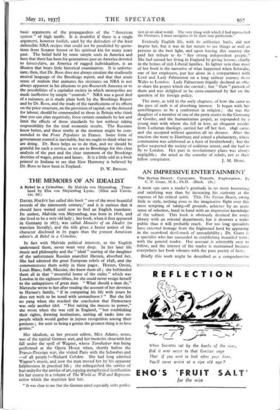THE MEMOIRS OF AN IDEALIST
A Rebel in a Crinoline. By Malvida von Meysenbug. Trans- lated by Elsa von Meysenbug Lyons. (Allen and Unwin. 12S. 6d.)
DANIEL HAUVY has called this book " one of the most beautiful records of the nineteenth century," and it is curious that it should have waited until now to find an Fnglish translator. Its author, Malvida von Meysenbug, was born in 1816, and she lived to be a very old lady ; her book, when it first appeared in Germany in 1875, was called Memoirs of an Idealist (to translate literally), and the title gives a better notion of the character disclosed in its pages than the present American editor's A Rebel in a Crinoline.
In fact with Malvida political interests, as the English understand them, never went very .deep. In her later life music and philosophy and the " ideal " rearing of the daughter of the unfortunate Russian anarchist Herzen, absorbed her. She had admired the great European rebels of 1848, and she commemorates them nobly in these pages. Herzen, Oroini, Louis Blanc, Saffi, Mazzini, she knew them all ; she befriended them all in that " mournful home of the exiles " which was London in the eighteen-fifties, for she could never resign herself to the unhappiness of great men. " What should a man do," Nietzsche wrote to her after reading the account of her devotion to Herzen's family, " if in comparing his life with yours he does not wish to be taxed with unmanliness ? " But she felt no pang when she reached the conclusion that Democracy was only another idol. " Not raising the masses to power," she wrote when she was still in England, " but establishing their rights, forming institutions, uniting all ranks into one people which would gather in joyous recognition among their geniuses ; for next to being a genius the greatest thing is to love genius."
Her, idealism, as her present editor, Miss Adams, notes, was of the typical German sort, and her memoirs close with her fall under the spell of Wagner, whose Tannhatiser was being performed at the Opeia House when, shortly before the Franco-Prussian war, she visited Paris with the Schwabes and —of all peOple !--Richard Cobden. She had long admired Wagner's musk,' and now the man moved her by hii apparent helplessness in pm-cued life ; she relinquished the service of humanity for the service of art, espying metaphysical jUstification for her course in a volume of The World as Will and Represen- tation which the musician lent her.
" It was dear to me that the German mind especially seeks perfec-
tion in an ideal world.. The very thing with which I had reproached the Gerthans, I must recognise to be their true perfection."
Evidently English life, with its utilitarian basis, did not inspire her, but it was in her nature to see things as well as persons in the best light, and upon leaving this country she paid her tribute to its " fine strong independent people." She had earned her living in England by giving lessons, chiefly in the homes of rich Liberal families. In lighter vein than most of her book is the narrative of what happened when Schwabe, one of her employers, put her alone in a compartment with Lord and Lady Palmerston on a long railway journey from Wales to London. Lady Palmerston frigidly declined an offer to share the grapes which she carried ; but " Pam " partook of them and was delighted to be cross-examined by her on the question of his foreign policy.
The story, as told in the early chapters, of how she came to the pass of exile is of absorbing interest. It began with her unwillingness to be a conformist in religion ; she was the daughter of a member of one of the petty courts in the Germany of Goethe, and the humanitarian gospel, as expounded by a young man with whom she fell in love, an eloquent seceder from Lutheran theology, carried her off her feet. 1848 came, and she accepted without question all its dreams. After the reaction she went to Hamburg and joined a phalanstery, where communion was celebrated as a feast of brotherhood ; but the police suspected the society of seditious intent, and she had to fly to London. Her part in revolutionary plans was always negligible ; she acted as the consoler of rebels, not as their














































 Previous page
Previous page